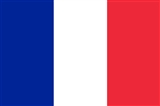
semi-presidential
republic in Western Europe
with several overseas territories and islands
located on other continent
s and in the Indian
, Pacific, and Atlantic
oceans. Metropolitan France
extends from the Mediterranean Sea
to the English Channel
and the North Sea
, and from the Rhine to the Atlantic Ocean. It is often referred to as l’Hexagone ("The Hexagon") because of the geometric shape of its territory.
303 On a voyage preaching the gospel, Saint Fermin of Pamplona is beheaded in Amiens, France.
451 The Battle of Châlons takes place in North Eastern France. Flavius Aetius's victory over Attila the Hun in a day of combat, is considered to be the largest battle in the ancient world.
732 Battle of Tours: Near Poitiers, France, the leader of the Franks, Charles Martel and his men, defeat a large army of Moors, stopping the Muslims from spreading into Western Europe. The governor of Cordoba, Abdul Rahman Al Ghafiqi, is killed during the battle.
987 Hugh Capet is crowned King of France, the first of the Capetian dynasty that would rule France till the French Revolution in 1792.
1140 French scholar Peter Abelard is found guilty of heresy.
1180 Philip Augustus becomes king of France.
1199 Richard I is wounded by a crossbow bolt while fighting France, leading to his death on April 6.
1214 Battle of Bouvines: in France, Philip II of France defeats John of England.
1259 Kings Louis IX of France and Henry III of England agree to the Treaty of Paris, in which Henry renounces his claims to French-controlled territory on continental Europe (including Normandy) in exchange for Louis withdrawing his support for English rebels.
1274 In France, the Second Council of Lyons opens to regulate the election of the Pope.

